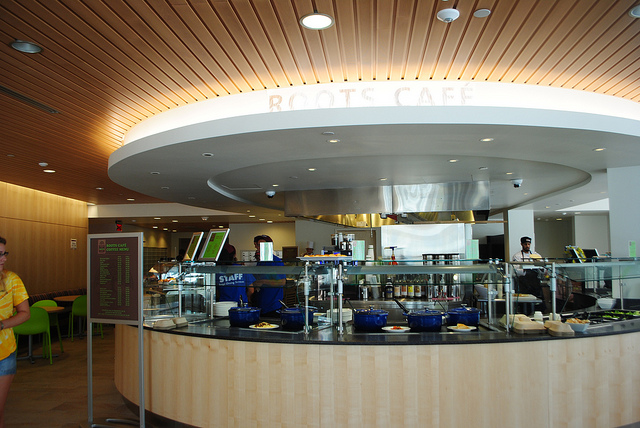“Dining?” the cashier at Roots Café asks, and I sigh and nod, trying to avoid looking at the leftover Dining Dollar balance on my receipt that has been consistently dipping lower and lower for the past six weeks. In the past month or so, I have faced a constant struggle of weighing whether or not using Dining Dollars was worth the convenience of Roots. Hunger paired with a certain sense of laziness creates a similar conflict for many students on campus.
The University of Massachusetts has been ranked number one in the country in dining for the third year in a row. The school emphasizes this fact every day, from handing out bags of food when freshmen check in on move-in day to sending out emails last week informing students about a presentation at the Hampshire Dining Commons by an award-winning chef. Even through my relatively short time at UMass, it’s easy to see why students’ rankings for the Princeton Review have brought our University out on top, with our four different dining halls, accessible hours spanning from 7 a.m. to 12 a.m. and specials like lobster and steak on Halloween. At first glance it’s hard to see how anyone could ever go hungry.
Since UMass Dining is already top ranked, it might seem hard to keep improving. Nevertheless, UMass promises to “continue raising the bar for dining.” This just seems to correspond to an increase in cost throughout dining options on campus. There have been recent cutbacks on key features like Late Night at Berk on the weekends, which was only reinstated after an uproar in disapproval from students. These cutbacks seem unwarranted, considering that just last year, an unlimited meal plan cost $2,978 and this year it’s up to $3,067. In September there was even a protest outside of Hampshire Dining Commons in opposition of the increase in dining prices.
Not only are the cost of meal plans rising, the charge for alternative dining locations like Roots, Blue Wall, Chicken & Co. and other cafes on campus are also too high to be worth the time and energy saved. Sure, the food is temptingly convenient, but the cost is still high compared to an average restaurant off campus. A grilled sandwich at Roots can cost up to around $8 with tax, and prices at Harvest and Blue Wall are hiked up us well. As a freshman, I wasn’t aware of how quickly expensive dining options like these would add up. All students are given “Dining Dollars” as part of their on-campus meal plans, but I already know several students who have used their entire balance due to a deadly combination of high prices and a proximity to Roots. I remember in the first and second weeks of school I probably went to Roots every two days or so, but I realized immediately this wasn’t sustainable with my Dining Dollar budget.
As a student with the unlimited dining plan, I am mostly affected by the inflated dining prices when I choose options like Roots or Blue Wall. However the commuter students, many of them juniors and seniors, face other challenges with dining plans like Your Campus Meal Plan, referred to as “YCMP.” This plan has several different options that allow students “Flexibility to eat whenever, wherever you want on campus!” Although this plan might sound appealing at first, students can only use swipes that are equal to $10. With prices so high, it’s often hard to get a good meal without going over the allotted amount, or else wasting the extra one or two dollars that remain.
With UMass’s stellar reputation, I would think they would have more reasonable dining options for commuter students as well as on-campus residents. Sure, it’s great to have a lot of dining options, but if they’re too expensive what’s the point? Additionally, Roots is the only “grab ‘n’ go” style eatery near the Honors College. This gives these students fewer options for when they want to conserve their Dining Dollars but also don’t want to walk to a dining hall, the closest of which is Berkshire or Hampshire, located in Southwest, about a seven-minute walk. In the extreme New England weather, Roots is the only sensible option. UMass should be considering more than just food when creating dining locations on campus.
UMass is very proud of its dining, and rightly so, but UMass Dining should think twice before cutting back on more perks or increasing prices again, as it’s obvious that students are already fed up with the current inflations. In order to truly “raise the bar” in dining, UMass should make a more obvious effort to provide affordable and accessible food to all students.
Alanna Joachim is a Collegian columnist and can be reached at [email protected].



















